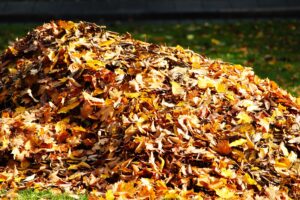 Chances are, most of us aren’t thinking about lightning bugs this time of year. But perhaps we should be.
Chances are, most of us aren’t thinking about lightning bugs this time of year. But perhaps we should be.
In the sweet, soft evenings of summer, few things are more pleasurable than sitting outside and watching the fireflies. But in the hustle and bustle of the holiday season, we’re far too busy decking the halls and hanging the lights and shopping and cooking and caroling and sending cards and watching Hallmark movies and all the other stuff that goes along with Christmas to even think about the amazing little bioluminescent beetles that flit and flash in the warm months.
We’re also terribly busy tidying up our yards for winter. Unfortunately, all too often this means getting rid of the leaves that “litter” the ground. We blow them. We burn them. We stuff them into enormous black bags and haul them off. We rake them to the curb where giant trucks with giant vacuums suck them up. We run the mower over our lawns one last time and chop whatever leaves remain into tiny pieces that cold winds will spirit away.
But here’s the problem. In doing these things, we’re almost certainly assuring that we’ll have fewer lightning bugs next summer. Maybe none at all.
Did you know that lightning bugs spend only five percent of their lives above ground? Or that only male lightning bugs fly and flash? They’re looking for girlfriends, most of whom spend summer evenings hanging out in tall grass, glowing just enough to attract the guys’ attention. After mating, females lay their eggs in undisturbed moist soil, which is often found—you guessed it!—under piles of leaf litter. When the eggs hatch, the larva will burrow down and spend several months (and in some firefly species, several years) in this rich, dark, protected environment as they transition to adulthood. Then they’ll emerge into the big, wide, wonderful world and the cycle will begin again.
If that’s not enough to keep you from getting rid of your autumn leaves, consider that fireflies are not the only creatures who seek shelter within and beneath them. Butterflies, moths and other insects, spiders, reptiles and amphibians, birds and small mammals all need warm, safe places to spend the winter. Leaves provide that.
Leaves are also nature’s fertilizer. They break down to become nutrient-rich soil. Instead of blowing or burning or bagging leaves, why not rake them onto your flower and vegetable beds? They’ll protect perennials from harsh winter temperatures and then rot and become dirt. What could be more wonderful than that? Or why not look upon leaves as free mulch and spread them around the base of trees and shrubs?
To celebrate leaves, I share with you the first and last stanzas of a classic children’s poem entitled “Come, Little Leaves,” written by George Cooper and published sometime in the 1880s. It goes like this.
“Come little leaves,” said the wind one day,
“Come o’er the meadow with me and play;
Put on your dresses of red and gold,
For summer is gone and the days grow cold”…
Dancing and whirling, the little leaves went:
Winter had called them, and they were content;
Soon, fast asleep in their earthy beds,
The snow laid a coverlid over their heads.
If that’s not enough to make us rethink lawn tidying, maybe the vision of abundant fireflies on sweet, soft summer nights will be.
(December 3, 2022)
)